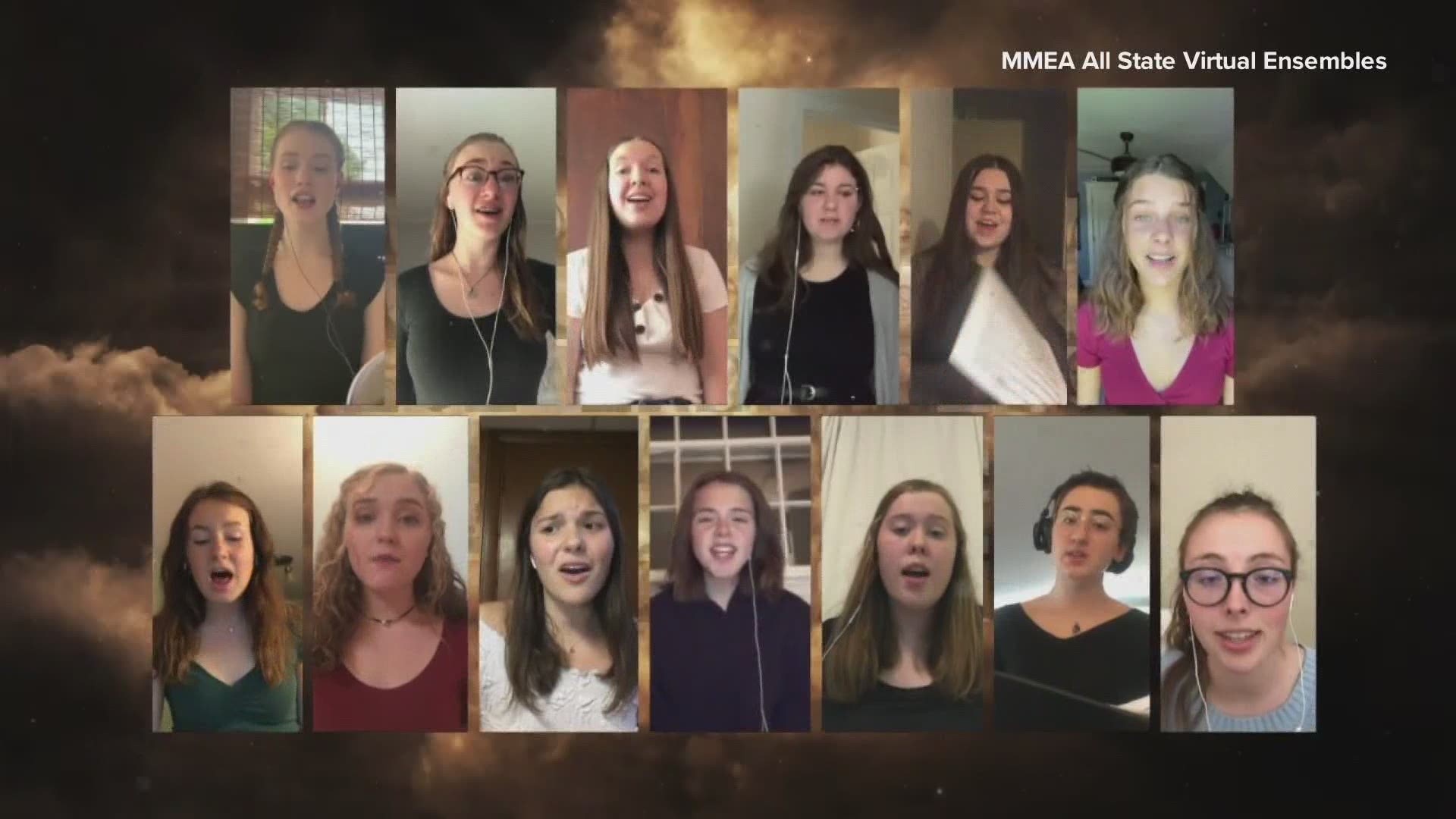WATERVILLE, Maine — Late Tuesday morning at the Carillo's household in Waterville is business as usual -- high school junior Colette Carillo is sitting on the back deck, strumming a ukulele and singing a tune she wrote herself. This is what a lot of Colette's music endeavors look like these days, since everything changed with the coronavirus' arrival back in the spring.
Speaking with NEWS CENTER Maine, Colette expressed her love for the arts, nothing that music has been a part of her family for as long as she can remember. At school, she is normally involved in a number of ensembles -- and says they are where she feels she fits in.
"I’ve made a ton of friends in choir, and I felt so many bonds that I wouldn’t have had if I didn’t have choir," Colette mentioned.
This year, though, those classes will be very different, if they even happen at all. In March, schools around the state adjusted quickly, as computers became the new classrooms. Colette says that period was really difficult, especially for music students who are used to practicing together.
"When you’re doing it in person, it’s much easier to feed off everyone else’s energy," Colette said. She added that getting that same kind of sensation through a screen just isn't really possible. When classes went remote, students were responsible for doing individual music assignments, so their teachers could monitor and assess their progress. Gone were the days of collaborating with peers in the same room.
"I just want everyone to be able to sing together, perform together, share that passion together again," Colette shook her head.
Music educators around the state are on the same page. Sandy Barry teaches instrumental music at Mahoney Middle School in South Portland. She is a firm believer in the importance of the arts.
"Music is a way for us to learn and process like no other," Barry expressed to NEWS CENTER Maine via Zoom.
She says South Portland is considered a "yellow" school zone, which means instrumental and choral students will learn remotely through the end of the year -- or until further notice.
"We’re planning for the worst and hoping for the best," Barry admitted. "Our kids pivoted with us the best they could in the early spring."
Andy Forster is also an instrumental music teacher, though he is based in RSU 18, which includes some towns in Kennebec County. Forster says one of the most special parts of his job is being able to connect with students throughout their time in school -- and when classes are remote, it's hard to continue to do that in the same way.
"My biggest fear is that with all the adaptations that are happening with teaching... students who are very interested in the arts may not get the instruction they might normally get," Forster explained to NEWS CENTER Maine via Zoom.
He says he will be conducting outdoor band classes while the weather is nice enough, by placing students 14 feet apart and having them use clothespins for their sheet music. He will likely have to get a sound system -- and if class moves indoors, students will probably shift to a rhythm ensemble. Forster says if the district switches to a zone other than "green" though, they will likely all have to go remote.
"We are creative people, and adapting is our thing," Forster noted confidently.
The changes are all designed to keep students and staff safe, after the World Health Organization acknowledged last month that the coronavirus can spread in the air -- which means crowded indoor settings like restaurants, nightclubs, and choir practices could pose a higher risk. Less ventilation in these settings could contribute to spread and allow the virus to linger in the air for longer times.
A specific example cited in research points to a choir rehearsal in Washington state on March 10. Of the 61 people there, 32 tested positive for COVID-19, and 20 had secondary probable cases. Three people were hospitalized, and two died. Experts say the spread likely happened because of a lack of social distancing.
It's why Maine officials are putting safety above all else, while trying to make sure students can still practice their crafts.
"Everybody’s learning so fast right now, but it’s just so important for kids to still have access to their teachers, whatever that means," Beth LaBrie, the executive director of the Maine Music Educators Association, told NEWS CENTER Maine. "It doesn’t mean in place/in person/close by, but there are still experiences for students to have and continue to learn and grow."
One constant that will remain, just in a slightly different way, is preparation for the All-State Music Festival, which is a big deal for high school band and chorus students every year. Auditions will still happen this fall, but they will be remote. Whether the festival itself next May will be remote like it was this past season has yet to be determined. The main message from these arts leaders -- music is not ending. It is just adapting to a new normal.

